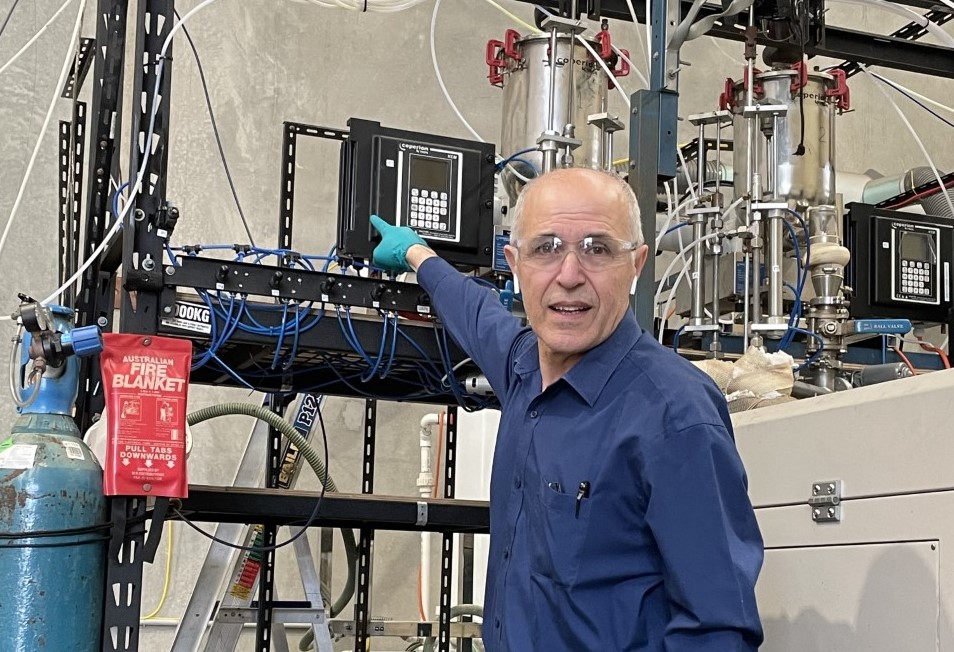Kinaltek has announced a “revolutionary” breakthrough in the production of battery grade nanosilicon materials that it believes will allow battery manufacturers to exploit the benefits of silicon anodes to achieve high-density energy storage at a disruptively low cost.
Nanosilicon materials are expected to form a key component of next-generation lithium batteries with Kinaltek Chief Executive Officer Jawad Haidar saying the specific capacity of the anodes in batteries using silicon can be several times higher than those featuring conventional graphite-only anodes. Haidar said until now the cost of nanosilcon has however been prohibitive with prices up to more than AUD 1,400 ($1,000) per kilogram, making the materials uneconomic for use in most common applications.
“The excessive cost is largely due to the complex, environmentally harmful, multi-step processes used in producing nanosilicon, such as chemical vapour deposition, plasma, ball milling,” he said.
Kinaltek said its patented KinSil technology is capable of directly converting common silica powders in a single step to silicon nanoparticles at a fraction of the cost of competing technologies. Haidar said the process is an extension of the company’s technology which reduces metal oxides to metal powders under very mild conditions of atmospheric pressure and temperatures below 500 C.
“KinSil is capable of producing a range of high-value silicon nanoparticles, including silicon nanopowders (Si-NP), silicon nanowires (Si-NW) and silicon-carbon nanocomposites at a production cost between USD 5 per kg and USD 50 per kg depending on which type of nanoparticle you want,” he said.
“As a result, KinSil makes silicon nanoparticles economic for use in any application and indeed, it makes silicon cheaper than graphite both on a mass basis and on kW per kilogram basis.”
Haidar said the technology marks an important milestone on the road to next-generation energy storage solutions with the capacity of lithium batteries inherently limited by their graphite anode, which is capable of storing about 300 milliampere hours mAh per gram of graphite. Kinaltek is aiming to bring enhanced high-performance nanosilicon to market with energy density up to 1,400 mAh per gram.
“The ability of KinSil to produce low-cost silicon nanowires and carbon-coated nanosilicon can be a game changer for lithium batteries,” Haidar said.
“High-performance nanowires and C-Si nanocomposites produced at a fraction of current prices can disrupt the energy storage market.”
Kinaltek said its technology is also capable of recycling silicon from end-of-life solar panels into nanosilicon through a simple primary step adapting the solar silicon for use as precursors for its process. In addition, the company said its KinSil technology has less than 20% of the carbon footprint of conventional multi-step processes and by-product is recyclable.
Haidar said the KinSil technology, developed in the company’s pilot facility at Villawood in Sydney, has been successfully tested on a lab scale at 1 kg level and the company has progressed to working on a pilot plant at ton quantity scale.
The company said the technology has already attracted significant interest from end-users, with the company talking to some of “the biggest manufacturers in the game.”
Despite this interest, Haidar said Kinaltek is currently negotiating a “significant” private investment to scale up the technology to commercial production which would allow the company to manufacture and commercialise its technology through supplying battery grade silicon-carbon composites and other nanosilicon products to the battery sectors.
“With adequate government support and market traction, Kinaltek hopes to keep its base in Australia,” he said.
This content is protected by copyright and may not be reused. If you want to cooperate with us and would like to reuse some of our content, please contact: editors@pv-magazine.com.




1 comment
By submitting this form you agree to pv magazine using your data for the purposes of publishing your comment.
Your personal data will only be disclosed or otherwise transmitted to third parties for the purposes of spam filtering or if this is necessary for technical maintenance of the website. Any other transfer to third parties will not take place unless this is justified on the basis of applicable data protection regulations or if pv magazine is legally obliged to do so.
You may revoke this consent at any time with effect for the future, in which case your personal data will be deleted immediately. Otherwise, your data will be deleted if pv magazine has processed your request or the purpose of data storage is fulfilled.
Further information on data privacy can be found in our Data Protection Policy.